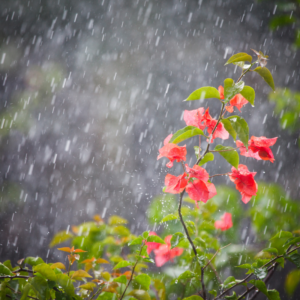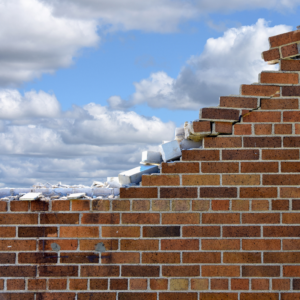Are you worried about how your masonry might fair against rain and harsh weather? Then, it’s time to invest in chimney waterproofing. This is the best way to protect your brick and mortar against the harmful affects of water and moisture exposure, and we’re here to answer all of your questions regarding it.
Something we missed? Reach out! We’d be happy to help with it all.
What are the most common water-related chimney damages?
- Masonry Damage: Since we’re addressing the importance of waterproofing, we would be remiss not to mention how damaging water is to your masonry overall. It causes mortar joints to crumble, bricks to crack and fall out, and various other types of deterioration throughout the structure, too.
 Damaged Liner: If water has access to the inside of your flue, your liner is sure to suffer, too. And because the liner is in place to protect both your home and your chimney, your risk of experiencing gas/smoke exposure and fire hazards will increase, too.
Damaged Liner: If water has access to the inside of your flue, your liner is sure to suffer, too. And because the liner is in place to protect both your home and your chimney, your risk of experiencing gas/smoke exposure and fire hazards will increase, too.- Rusting: When your chimney isn’t set up right to ward off water and excess moisture, your damper, chimney cap, flashing, and/or chase cover could face some serious rusting and decay.
- Interior Home Damage: Once your chimney experiences damage, it won’t be long until water enters through vulnerable areas and starts causing damage in your home. This most typically results in rotted woodwork, wall/ceiling stains, and mold or mildew accumulation.
- Clogs: As water breaks down your chimney, it’s not uncommon for pieces of your clay liner to break off and fall into it. This causes clogs and obstructs airflow, which then ups your chances of experiencing dangerous hazards every time you light a fire.
- Collapsed/Tilted Chimney: Worst case scenario? You neglect to have your chimney damages addressed and wind up with a tilted chimney or even a collapse. This is bound to cause damage to your home, too, and it’s extremely time-consuming and costly to have fixed.
Wondering how to spot damage early? Watch for discoloration throughout the chimney – this could be white efflorescence, red rust stains, green mold, or black/brown soot stains. You may also notice pools of water in your system or hear a dripping in your firebox. And keep your nose alert to any musty smells… Some even note a campfire-like smell that forms when your creosote mixes with water.
And, obviously, if you notice any major cracking, decay, or crumbling, be sure to call us in.
Which should come first – repairs or waterproofing?
So, let’s say there are definite signs of leaks and water damage throughout your chimney. Should you invest in waterproofing first, hoping they won’t get worse, or should you have repairs booked before waterproofing?
We’ll always recommend having all necessary repairs completed before any waterproofing products are applied. That way, any materials or new products we use to fix up your system won’t miss out on this protection, and you’ll be sure to get those long-lasting results you’re hoping for.
Our crew is trained and equipped to restore your masonry, chimney crown, flashing, and more, so no matter the issues you’re facing, we can be your go-to crew for it all.
I’m not spotting damage… Do I really need waterproofing?
 Even if you don’t see any signs of damage, it’s still imperative to invest in waterproofing and other forms of preventive care. There’s a common misconception that bricks can withstand anything, but they’re actually quite helpless when it comes to water. Even if you don’t have damage yet, you’re bound to face some down the line if you neglect care.
Even if you don’t see any signs of damage, it’s still imperative to invest in waterproofing and other forms of preventive care. There’s a common misconception that bricks can withstand anything, but they’re actually quite helpless when it comes to water. Even if you don’t have damage yet, you’re bound to face some down the line if you neglect care.
Long story short? If your system is in good shape, it’s important to do everything possible to keep it that way!
And keep in mind that, just because there are no obvious issues, it doesn’t mean that damage or buildup isn’t there, hidden within your flue. Be sure to book an inspection before every burning season to make certain you’re good to go.
I’m well-known for my DIY skills… Can I attempt it?
We get this a lot when it comes to chimney repairs and maintenance, but the answer is almost always going to be no – DIY is not recommended.
In the case of waterproofing, it’s just too easy to miss important areas of the chimney, and if one spot is left vulnerable, then your whole system will be at risk. Water-related damages can easily spread throughout your system, and it won’t be long until your face masonry deterioration, rust, leaks in your flue, and more.
Basically, not only will you be out the time you spent you spent on the job and the money you spent on the waterproofing supplies, but you’ll be out even more dough for the repairs you now need.
Not to mention, many products in today’s market just aren’t up to snuff. Professionals use trusted products that are vapor permeable, meaning your brickwork will still be able to breathe out necessary vapors and any pre-absorbed moisture. Other sealants just trap moisture in, where it will continue breaking things down.
I have a prefab system… How can I protect it?
Now, prefab systems don’t have a masonry chimney, so they don’t need waterproofing… but they still need to be protected from water! Be sure to have yours professionally fitted with a well-built chase cover (if you’re still using the stock cover it came with, it’s probably time to ditch it), and you’ll need a chimney cap installed, too, if yours is missing or broken.
Give Our Experts a Call
Our experienced crew is standing by, ready to help you out with it all. Call us at 530-841-1841 today or reach out online. We’d love to get started soon!

Recent Comments